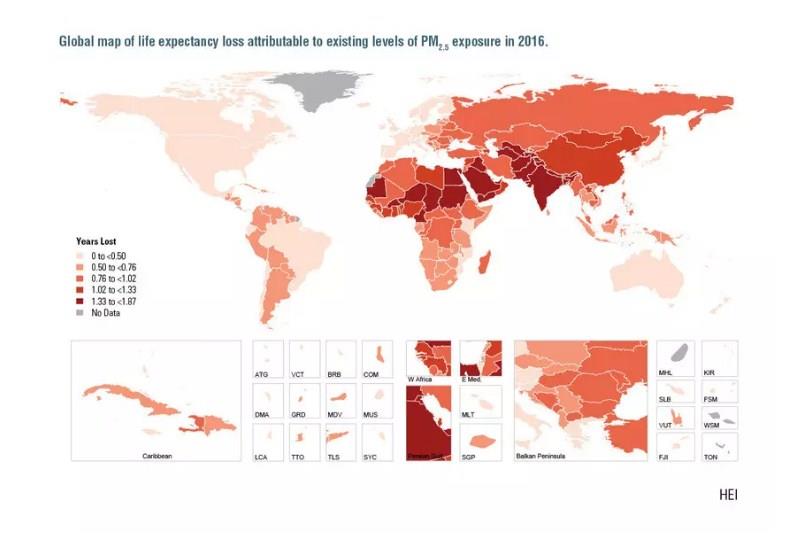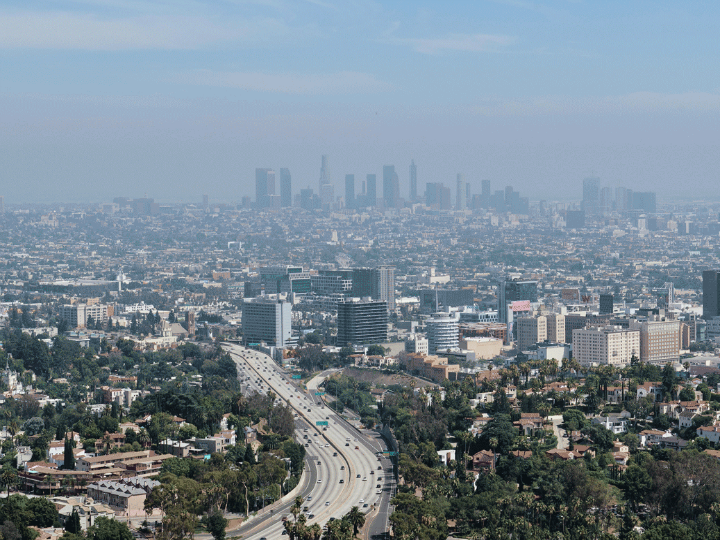by Roderick Weller and Eleni Michalopoulou*
The challenge
Outdoor air pollution has a substantial impact on health, mainly from breathing pollutants and small particulate matter (often referred to as PM2.5) that travel deep into the lungs. These invisible harmful particles can cause cardiovascular and respiratory disease and lung cancer.
The World Health Organization (WHO) has associated approximately 4.2 million premature deaths per year with health issues related to air pollution. According to the Global Burden of Disease (GBD) outdoor air pollution is related to more deaths than unsafe sex leading to HIV/AIDs, unsafe water, or malaria. Annual air pollution-related diseases also have a much higher death toll than COVID-19 to date.

Unlike COVID-19, however, children are susceptible with strong evidence showing that exposure is damaging to unborn children, affecting the number of pre-term births, childhood asthma, neurodevelopment, lung function and more. However, most of the people dying early due to exposure to PM2.5 are older. Low income communities are also disproportionately impacted as they are much more likely to be living in areas of high air pollution, leading to poor health with less access to quality healthcare.
Tackling air quality will not just save lives but can also inject urgency into the climate change agenda. The causes of climate change are often the same as air pollution: transport, power sector and industrial emissions. Capitalizing on the growing public and political awareness of the health impacts of air pollution, we can both accelerate climate action and improve public health.
The International Day for Clean Air for blue skies
Over the last months, some studies have indicated certain positive short-term effects on air quality following the strict lockdown measures when comparing the same period year on year in major cities, for example there was a 25% reduction in PM in New York City, 32% in Sao Paulo, 60% in Delhi and 54% in Seoul. However, as economies restart and lockdown measures are eased, air pollution is rebounding quickly to pre COVID-19 levels. There is an opportunity to either support a green recovery and build back better or lock-in patterns that will do permanent damage to our fragile systems for many years to come.
The International Day for Clean Air for blue skies has arrived at an important moment, taking place for the first time on 7 September 2020 as an annual event for at least the next ten years, to raise awareness, promote solutions and gain momentum for global action to combat air pollution. We must take the lessons learnt from the shutdowns to inspire cleaner air after the pandemic and make sure that investment into economic recovery promotes reduced emissions in parallel.
5 ways the private sector can tackle air pollution
Business and industry have a key role to play to reduce air pollution, since many of their activities cause emissions. They are both contributors and solution-providers; making them essential to lowering pollution, building innovation and showing governments that fixing air pollution and economic development are not mutually exclusive. It is important to create a space where the scientific community, policy-makers, government officials and the private sector can strategize to reduce air pollution.
Here are 5 actions the private sector can take:
1. Adding air quality to their Corporate Social Responsibility activities and reporting
2. Quantifying air pollution down the supply chain and/or manufacturing processes
3. Collecting the data required to develop emission inventories for key major pollutants related to the companies’ own activities
4. Establishing programmes that reduce air pollution from their own operations and also from their suppliers
5. Promote awareness campaigns to transparently communicate the levels of emission caused by their operations and explain what they will do to reduce those emissions
Examples of private-sector action already underway
IKEA, part of INGKA Group, created the Better Air Now Initiative with an ambition to make a model to reduce air pollution by turning rice straws that would otherwise have been burnt in the Northern states of India into a product range. Crop residue burning is one of the biggest causes of pollution in India even though laws prohibit the practice. The challenge is the machinery needed to clear the fields is expensive and for many farmers burning is the only affordable approach. With IKEA, the rice straws will become a renewable material source for their collection. IKEA have also put sustainability first in their strategy by aiming to use 100% renewables for their operations and supply chains and to have zero emissions from home deliveries by 2025.
Johnson & Johnson aims to use its global reach and resources to encourage communities and policy-makers to take more action by using health as one of the catalysts for change. For example, they were founding partners of the Medical Society Consortium on Climate & Health, a group of top medical associations with more than 500k clinicians to help educate Americans about the health effects of climate change and actions they can take. They have also set targets to reduce the carbon footprint of their operations and transparently post the progress every year. They have joined the Climate Group’s Renewable Electricity 100 (RE100 businesses commit to source all their electricity from renewable sources) and support C40 Cities Climate Leadership Group to drive impact in cities.
The sources of climate change and air pollution are closely aligned, and solutions can be taken to address them simultaneously. Danfoss has put sustainability at the core of their business with climate action as a top priority. They were the first global technology company to commit to three of the Climate Group’s initiatives of RE100, Energy Productivity 100 (EP100 businesses commit to doubling their energy productivity by 2030) and Electric Vehicles 100 (EV100 business commit to accelerating transition to EVs and making electric transport new normal by 2030). Over recent years, Danfoss has considerably lowered its global energy intensity and will transition the remaining demand to renewables and change the car fleet to all electric by 2030 at the latest.
Novo Nordisk have taken a bold and company-wide approach with a new environmental strategy with an ambition to have zero environmental impact. The nature of their business puts them at the frontline of some of the biggest environmental issues, including climate change and pollution. In 2020, they achieved their goal of only sourcing 100% renewable electricity across their global productions, with a target to have zero carbon dioxide from their operations and transport by 2030. Another shift they are taking is only to work with suppliers who share their mind-set of zero impact both up and down the supply chain.
Siemens Mobility has launched a new, real-time system that monitors air quality. This system can be used by local authorities as a way to intervene when it is necessary to improve air quality. This tool is the result of a partnership between Siemens and the air quality experts of EarthSense and it is called ‘Zephyr’, a name exceptionally apt as Zephyr was the name of the Greek God of West Wind. The sensor ‘Zephyr’ can produce real-time measurements for various pollutants including ozone (O3) and particulate matter (PM2.5). The hope is that this system can be used in traffic management applications.
In 2019 the Philips Foundation, in collaboration with the University of Manchester and Global Action Plan, launched the first of its kind ‘Clean Air for Schools Programme’. This programme will include more than 20 participating schools and 6,000 students. It aims to support schools to improve air quality as well as understand the impact of air pollution in schools by studying the varying levels of air quality in classrooms and how this affects school children. In this partnership, The University of Manchester will provide air monitoring equipment and analysis to investigate the state of air pollution in schools. The analysis will include pollutants like particulate matter (PM 2.5 and PM 10), carbon dioxide (CO2), nitrogen oxides (NOx) and ozone (03).
Clear skies ahead?
The scale, complexity and urgency of the air pollution challenge requires far more in the way of integrated thinking and combined effort. A scaling up of public-private dialogue and collaboration across energy, mobility and health is needed.
The World Economic Forum’s Alliance for Clean Air, working closely with the UN Environment Programme, Climate and Clean Air Coalition, Stockholm Environment Institute (University of York) and other partners, will continue to support the International Day of Clean Air for blue skies over the following years by regularly bringing together stakeholders from different sectors and different organization types (businesses, governments, institutions, academics, NGOs) to share facts, best practice, work through the barriers to action, and have a place to develop public-private partnerships.
*Project Lead, Clean Air, World Economic Forum and Research Associate, Stockholm Environment Institute (SEI), University of York
**first published in: www.weforum.org




 By: N. Peter Kramer
By: N. Peter Kramer
